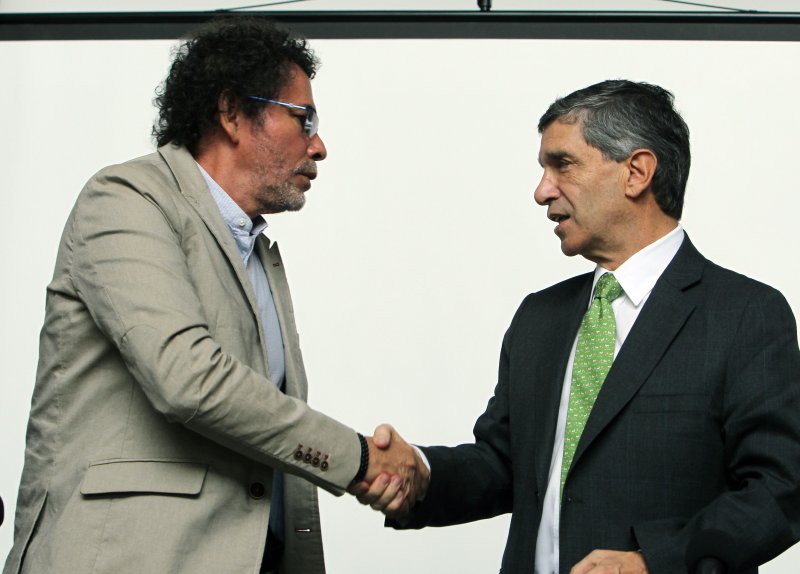Member of FARC Felix Antonio Munoz Lascarro, left, also known as Pastor Alape, and Colombia's High Counselor for Post-Conflict, Human Rights and Security Rafael Pardo shake hands during a press conference in Bogota on January 27, 2017. The Colombian government and FARC announced a program to replace about 200 square miles of illegal crops, mainly coca plants, during its first year of implementation in 40 municipalities of the country. Photo by Mauricio Duenas Castaneda/EPA
Jan. 30 (UPI) -- The Colombian government under President Juan Manuel Santos and the FARC rebel group said they will join forces to help move farmers away from planting coca, used to make cocaine.
The Revolutionary Army Forces of Colombia, or FARC, dominated and heavily relied on the cocaine trade to fund its insurgency. In peace efforts, the government and FARC agreed to offer farmers monthly payments if they voluntarily destroy coca crops.
Farmers will also be offered loans and assistance with planting alternatives such as fruits and cacao. Santos' administration estimates it will spend $340 million in the effort that will affect 50,000 families.
"The peace advances [to] transforming the fields. Program to replace illicit crops -- communities will thrive with alternative products," Santos said in a statement on Friday.
Many poor families in Colombia's rural, mountainous communities rely on the coca trade. Rafael Pardo, who Santos appointed to establish the program, said each family will receive $350 a month, along with other help.
In the first year of the program's implementation, the effort will eliminate about 200 square miles of illicit crops in about 40 of Colombia's municipalities. FARC's role in the program was not fully disclosed but some suggest the rebel group will identify where it grew and bought coca.
More than 220,000 people have died and some 5 million have been internally displaced since FARC's founding in 1964. The militant rebel group has been involved in drug-trafficking, kidnapping to acquire ransom payments and other illicit activity to fund its insurgency campaign.
In late December, Colombia's Congress unanimously approved an amnesty law that is part of a revised peace agreement with the FARC.
Colombian citizens rejected the first version of a peace agreement in a 50.2 percent vote in early October.
The revised peace deal, which was expedited through Congress and approved by Congress in early December, will not be submitted to a popular vote. The opposition criticized the latest version of the deal as "merely a retouch" of the rejected agreement.















